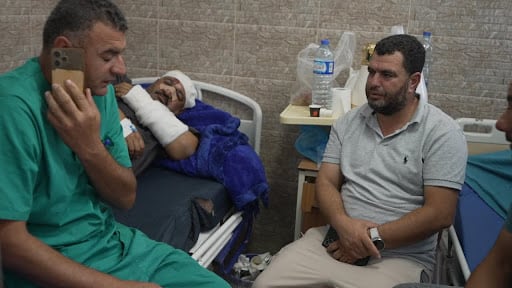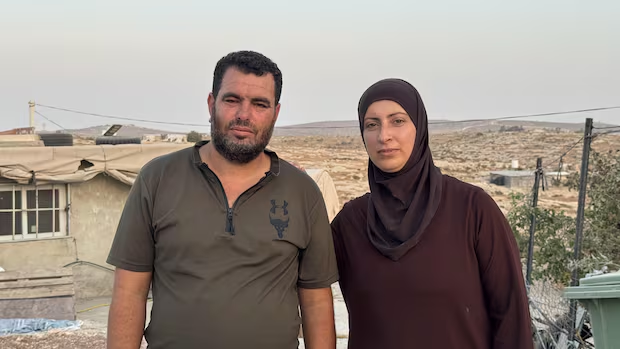The small hospital room in the Palestinian city of Yatta in the occupied West Bank is crammed with visitors. Their voices are hushed, their quiet presence the main source of comfort.
Khader Nawaj’ah lies on his side, his face bruised and swollen and his left hand in a cast. A sheet hangs between him and the bed his wife, Fatima, is on, her broken arm in a sling.
The Nawaj’ahs say they were sleeping outside their home in the Palestinian village of Khirbet Susiya in the South Hebron Hills to find some respite from the heat. They woke to the sound of their own screams as Israeli settlers from a nearby outpost attacked them.
“Settlers were surrounding me from the moment I woke up, and they were hitting me with stones, not just little stones, big stones,” Nawaj’ah told the fifth estate co-host Ioanna Roumeliotis from his hospital bed.
“I’m 56 years old, and I wouldn’t be able to lift or carry it with one hand. and I’d never been hit with such big stones. Then they started hitting me with sticks.”
The Nawaj’ahs were just the latest victims of settler attacks to come through this hospital, said Dr. Tareq Abu Aram, who often treats victims.
“Many times, sometimes daily, at this time, two days weekly, at least.”
Since May 2024, the Canadian government has sanctioned 17 individuals and seven entities for perpetrating “extremist settler violence against civilians” in the West Bank. Canada has said the ongoing violence “has undermined the human rights of Palestinians, prospects for a two-state solution and posed significant risks to regional security.”
In the West Bank city of Yatta, Dr. Tareq Abu Aram describes how often he treats victims of Israeli settler violence to the fifth estate’s Ioanna Roumeliotis, who visited Yatta hospital in August and spoke with Palestinians who were injured.
But tax deductible donations made by Canadians to groups that financially support the West Bank settlements are continuing in the face of the escalating attacks on Palestinian civilians, an investigation by CBC’s the fifth estate has found.
- Watch the full documentary, “Funding the occupation,” from the fifth estate on YouTube or CBC-TV on Friday at 9 p.m.
Nasser Nawaj’ah is a relative and neighbour of Khader and Fatima who works as a field researcher for the Israeli human rights group B’Tselem documenting settler violence. He says Canada should live up to its commitment to international law, which considers Israeli settlements illegal, and crack down on charities that run counter to that policy.
“On the one hand, Canada respects international legality while on the other hand, the Canadian charities are breaking the law by funding and boosting Israeli settlements,” he told Roumeliotis.

Most of the 500,000 settlers who live in the West Bank are not involved in physical violence against Palestinians, but critics say their very presence is complicit because it legitimizes the violence some settlers resort to to lay claim to the land.
Contributing to the public good
Canadians get a tax break for charitable giving because they are contributing to the public good.
Under tax rules, the Canada Revenue Agency requires a charity to show it has direction and control over donations and that it is donating to charitable causes.
It is not permitted to transfer money collected from Canadians to foreign entities to spend as they see fit. Furthermore, it is illegal for Canadian charities to send donations to a foreign military.
Despite these restrictions, CBC’s investigation reveals Canadian donations continue to fund organizations, including the Israeli military, that support the ever-expanding settlements in the West Bank.
Nasser Nawaj’ah, a farmer and field researcher for the Israeli human rights group B’Tselem, shares details in Khirbet Susyia about how settlers attacked his neighbours and family members in the middle of the night while they slept.
“We are financing war criminality through our charitable system,” said Miles Howe, an academic researcher in Ontario who studies pro-Israeli charities in Canada.
The overall value of donations to the West Bank is difficult to gauge. In recent years, the Canada Revenue Agency (CRA) has revoked the charitable status of multiple charities that sent tens of millions to Israel over decades, according to CRA tax filings.
Charitable status revoked
Last year, the CRA revoked the charitable status of the Jewish National Fund of Canada in part for failing to have control and direction of donations sent to Israel and giving to entities not deemed charitable causes.
Past CRA audits had scrutinized JNF for “conducting projects in the occupied territories” and “support for armed forces of another country.”
JNF Canada is appealing the revocation through the courts. Last month, it announced that a registered Canadian charity called Friends of JNF Canada had “stepped forward to dedicate their charity to carrying out similar work” and that “this organization will continue supporting the kinds of projects that have always defined JNF Canada’s mission.”
Other charities that continue to operate have also been the subject of public complaints for allegedly not directly funding charitable causes, not having direction or control over where their money goes and giving to entities affiliated with the Israeli military, including Mizrachi Organization of Canada.
The Toronto-based charity only recently provided the CRA with details of where in Israel its money went. Howe’s research looked at Mizrachi Canada’s tax filings in 2022 and 2023, which show that more than $4 million went to dozens of groups supporting settlement activity in the West Bank.
Others, like the Canadian Zionist Cultural Association, continue to send millions every year to groups that support Israeli soldiers.
Fear for their homes
In the 1980s, Israel removed Palestinians in Khirbet Susiya from their homes and established what is now an archaeological site, including an ancient synagogue. The Palestinian families built new homes on farmland they own nearby, but Israeli authorities have deemed that village illegal.
As well as the constant spectre of settler violence, residents also fear their homes could be demolished at any time.
“There are very few impediments to Israeli bulldozers arriving and just totally flattening all of this,” B’Tselem’s international director, Sarit Michaeli, told the fifth estate.
This past June, an online Israeli fundraising site, JGive, was accepting Canadian donations for an Israeli entity called the Mount Hebron Fund to expand the Israeli settlement neighbouring Khirbet Susiya — spelled differently but also called Susya.
The Mount Hebron Fund was one of the Israeli entities sanctioned by Canada in 2024 for supporting violence against Palestinians in the West Bank.
In June, the fifth estate donated $25 to the Mount Hebron Fund to see what would happen. Initially, the CBC investigative program received an email indicating that it would get a tax receipt from the registered Canadian charity Mizrachi Canada.
Donation refunded
Weeks later, following requests for interviews with both the Mount Hebron Fund and Mizrachi Canada, the fifth estate received an email from JGive indicating that “due to a technical error, the campaign was temporarily made available for Canadian dollar (Cdn) donations through our platform, despite the fact that Mizrachi Canada has not authorized this page and cannot process this donation.”
JGive issued a refund, but the email added the “Hebron Fund campaign remains open and eligible to receive donations in other currencies.”
Mizrachi Canada did not respond to numerous requests for an interview for this story.

Activists have complained to the Canada Revenue Agency that Mizrachi Canada is acting as a conduit of funds for Israeli activities in the West Bank contrary to Canadian public policy and tax rules — that simply offering Canadian tax receipts for online donations to Israeli entities is not demonstrating control or direction over charitable activities.
“It’s not a legal activity under the Income Tax Act. Acting as a conduit [for funds] is not a charitable purpose,” said Howe.
From 2007 to 2022, Mizrachi Canada disclosed sending more than $50 million to Israel and issued tax receipts to Canadians.
Complaints to CRA
But according to Canada Revenue Agency documents released through an access to information request, Mizrachi only started providing details of specific recipients in recent years.
Activists have also complained to the CRA about the Canadian Zionist Cultural Association (CZCA), a registered Canadian charity that sends millions of Canadian tax-deductible donations to entities in Israel affiliated with the military, including the Association for Israeli Soldiers and Friends of the IDF.
“Canadians by and large are not aware that their money is going over and is being used to subsidize the Israeli army. If they knew what was happening, I think most people would be outraged,” said Toronto lawyer Shane Martinez who volunteers with the International Centre of Justice for Palestinians. Martinez made the complaint to the CRA against the CZCA and says the millions of dollars in tax breaks take away from Canada’s public coffers.
The CZCA did not respond to the fifth estate’s interview request and would not let a fifth estate journalist into a recent fundraising event in the Greater Toronto Area.
Naomi Kahn, international director of the Israeli non-governmental organization Regavim, questions the legal rights and land claims of Palestinian families living in the village of Kherbit Susiya.
Martinez has also recently requested that the RCMP investigate the Jewish National Fund Canada for possible war crimes around the building of Canada Park, which was built in the 1970s on former Palestinian villages in the West Bank that were demolished by Israel in the 1967 war. He says that building anything in the West Bank — including the park — is illegal under international law.
The fifth estate reached out to JNF for comment but we did not hear back from them by the time of publication.
Laws are ‘stringent,’ minister says
The CRA declined to be interviewed for this story, but fifth estate co-host Ioanna Roumeliotis caught up with Canadian Finance Minister François-Philippe Champagne on Parliament Hill to ask him why Canada’s tax authority continues to allow Canadian charities to send donations supporting settlements in the West Bank and indirectly the Israeli military, when those donations run counter to Canadian foreign policy and break charity rules.
“We have very stringent laws regarding — I mean if you look at the tax code for example, with respect to charities, I think the laws of Canada are in line with what you find in other G7 countries as far as I know,” said Champagne.
“We always make sure the CRA … that anyone who wants to qualify as a registered charity follows all the rules and principles that we have in the tax code and as far as I know they usually have been established in Canadian law for a long time.”
Ioanna Roumeliotis sits down with former Israeli prime minister Ehud Olmert in Tel Aviv to share his thoughts on peace and compromise, starting in the West Bank.
Former Israeli prime minister Ehud Olmert has been outspoken about the ongoing settler violence against Palestinians in the West Bank.
“What happens in the West Bank leaves Israel with [absolutely] no defence, while Gaza is a war zone, there is Hamas, and Hamas is a murderous organization, a terrible organization which needs to be eradicated,” Olmert said in an interview with the fifth estate.
“One day we will be brought to the [International Criminal Court in the Hague], not because of Gaza, because of what happens in the West Bank and we will have no good defence. Because it happens in front of our eyes and no one seems to care.”
Back in the Palestinian village of Khirbet Susiya, Hiyam Nawaj’ah said sleep is often elusive as residents continue to live in fear of settler attacks and the possibility that they could be forcibly moved off their land at any time.
The future seems bleak, said her husband, Nasser Nawaj’ah. There have been no arrests for the settler attack against Nawaj’ah’s relatives Khader and Fatima.
“No justice for us, for the Palestinian.”
WATCH | Former Israeli PM on settler violence in the West Bank and a 2-state solution :
Source link










